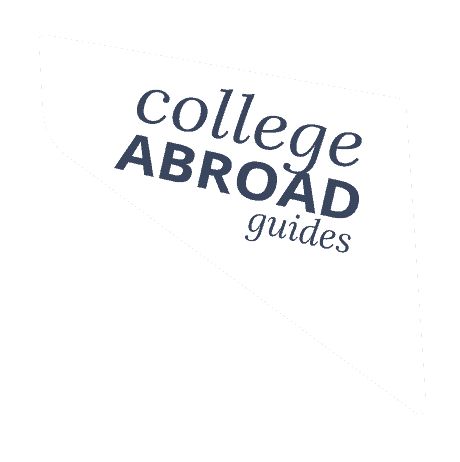
How to Go to College in the Netherlands: An Absurdly Easy Guide

- Originally published
- Last updated on October 24th, 2023 at 02:55 pm
Table of Contents
How do you go to college in the Netherlands?
1. Find English-taught programs that are up your alley
2. Consider liberal arts colleges
3. Know U.S. diploma requirements and how students are admitted. For example, many universities admit all students who meet the qualifications until the program is full. Learn when to apply to get in.
4. Upload your materials to Studielink, the national application portal.
5. Make your own budget
6. Orient yourself to Dutch student culture
7. Apply for a visa and dive in
The 101 Guide to Getting a Bachelor’s Degree in the Netherlands
The Netherlands is one of the most student-centered countries. Biking along canals? Got it. Safe towns an easy train ride from international clubs? Done. It makes perfect sense that lots of international students want to go to college in the Netherlands. We think more Americans should consider higher education in the Netherlands.
But how? It starts with getting to know how the Dutch system differs from your home country, figuring out things like:
How many programs are available in English?
How much does university cost in the Netherlands?
When does the academic year start? Are programs 3 or 4 years long?
How welcoming is Dutch culture to international students?
How does housing work?
How much aid is available?
How will I find housing?
Overall, the speed bumps are worth it for most students. In writing our guides, we’ve talked to hundreds of students, both Dutch and international, about what they like about their universities and student life. The vast majority adore this student-friendly, safe country where they are taught by experts in their fields.
The Dutch system is also great because it’s flexible for students who want to dive right into their major (European-style). There are also programs for students who aren’t ready to decide or want to study multiple subjects over the course of their studies (American-style).
Check out prestigious three-year liberal arts programs in the Netherlands’ university colleges, like Amsterdam University College or University College Utrecht for a broad-based, American-style degree.
Dive into all the Netherlands School Guides
Americans don’t always consider non-English-speaking countries as seriously as places like the UK or Canada, but the Netherlands is highly international, an English-language giant in a safe, prosperous, developed world. You may not have heard of all their researchers, but you can be sure they’re experts in their fields, making inroads into this small country’s oversized academic reputation every day.
We are talking to tons of the Netherlands’ international students in order to compile guides to all their universities, and there are some common threads. Let’s break them down.
Outstanding Universities
First, it’s got a reputation for outstanding universities. Of its research universities ranked by Times Higher Education world rankings, all are ranked between 62 and 250 globally. The Dutch have research facilities that rival the best universities in the world. Undergraduates benefit from being around top teaching faculty.
Mad English Skills
Second, the Netherlands is the epicenter of English learning among non-English speaking countries. Many programs are taught entirely in English with no other language requirements. There is little need to cram Dutch language courses into an already stressful student schedule.
Residents of the Netherlands have largely embraced English as their lingua franca. Most of its population can speak it (especially younger generations and students). This makes international travel in the Netherlands easy. International students do not need to fear that things like handling their bills will be conducted in a language they don’t understand.
Student-Centered Life
Third, Dutch culture can look a lot like student culture. It’s long known for its progressive politics, like its harm-reduction policies around sex work and soft drugs.
This young culture extends to the country’s well-known love of bicycle travel. You can ride between cities if you like. A stellar public transportation system handles longer trips, making the whole country accessible to students without cars.
American students may find that for all these reasons, integration into Dutch society is easy. Let’s look at some other factors that might influence whether you should go to a Dutch university.
Can I go to college in the Netherlands?
Yes! Higher education in the Netherlands is open to applications from international students. Because the country has developed such a reputation as an international country, there are country-specific admissions requirements listed for degree programs. Check your program if you’re unsure if your credentials qualify you for admission.
English-language websites also abound, making the country easy to navigate for international students figuring out campus life. In fact, the biggest problem with navigating the Netherlands for would-be students is sorting through the abundance of programs.
Bachelor’s Portal lists 342 bachelor’s BA and BSc degrees in the Netherlands. Study in Holland adds more, finding 475.
Forty-nine different schools offer completely English-taught degrees. And that’s not counting several small, private business school programs.
Is the Netherlands good for international students?
The Welcoming Dutch Culture
The Netherlands is a top country for international students.
It is centrally located within Europe and is a destination for international travel worldwide. And students can even consider studying abroad as part of their Dutch program.
The Netherlands is also one of the easiest places to be an English-speaking student. Even outside the university setting, 95% of the population speaks English.
Programs taught in English attract an international student body that elevates the level of discussion and broadens all students’ experience. In fact, pre-Covid, there were ~94,000 international students in the Netherlands. That’s more than one out of every 200 people. In Amsterdam, the population is more international than Dutch, with 50.5% international residents.
International Dutch Student Life
Dutch colleges are just as welcoming as the rest of the country. The Netherlands even has an international education portal, Nuffic, to help facilitate international applications. The organization boasts that international students comprise about 20% of Dutch universities. While this figure includes master’s and post-graduate programs with very high levels of international students, the numbers are still astronomical.
Further showing the strength of the international community in Dutch universities, several schools have clubs for international students. Newcomers can meet other internationals and get advice on fitting into their new country.
Resources like these make the country attractive to international students. Clubs and sites provide scholarship information, logistical support, and articles about adapting to the culture, working, and housing options.
Want to stay forever? Your post-graduation prospects are great. You’ll find strong expat communities throughout the Netherlands. You can also look into career opportunities in the Netherlands.
Can international students work in the Netherlands?
Yes. There are many internships and work opportunities for American students attending college in the Netherlands. But your student visa doesn’t include internships. To work, U.S. (and other non-EU students) on a student visa must convince their potential employer to apply for a work permit. Luckily, permits are free for employers. You’ll be able to work up to 16 hours a week during the school year and full-time during the summer. You’ll also need Dutch health insurance.
Self-employed? You can keep doing your remote gig for as many hours as you like while you study in the Netherlands. Self-employed workers won’t need Dutch health insurance.
There’s an added step to secure a job as a student in the Netherlands compared to another popular country choice—the U.K. In the Netherlands, you must convince an employer to apply for a work permit for you (it may also be harder to get these sorts of jobs as a non-Dutch speaker). However, creators and freelancers have it easier in the Netherlands. They won’t be forced to give up their work and find another source of in-country income over breaks.
Are you doing an internship as part of your studies? Your employer will not need to apply for a work permit on your behalf. They will need to have an internship agreement and present it when requested.
After your program, you can stay in the Netherlands as a new grad for a year. During this time, you can work, volunteer, or do internships for as many hours as you like. You’ll use a Dutch “orientation year visa.” You can learn about it on the Dutch immigration and naturalization service site (in English).
How many universities can you apply to in the Netherlands?
There are a couple of different courses of study in the Netherlands: “numerus fixus” and “non-numerus fixus.” All university colleges are non-numerus fixus programs. Numerus fixus just means a program that has a cap on enrollment. in these programs, a fixed number of students can be admitted to the program. Get it? The number is fixed. Numerus fixus is a designation given to popular courses of study, like some psychology or international business programs. These programs attract a large number of applicants. They can selectively choose to admit just some of their qualified candidates. For most schools to accept you, you’ll want better grades than the minimum requirements.
Through Studielink, the Netherlands national application portal, you can apply to four total programs. However, you can apply to just two numerus fixus programs at a time. Interested in becoming a doctor? You can only apply to one medicine program at a time.
There’s a silver lining to this restrictive system: you can change your application schools anytime before the enrollment date.
How many universities are in the Netherlands?
There are 38 total applied sciences and research university bachelor’s schools in the Netherlands with study programs in English. Most offer multiple programs, totaling nearly 500 English-taught bachelor’s degrees in the Netherlands.
Additionally, there are 11 university colleges (self-contained faculties within research universities that offer liberal arts and sciences programs). When your preferred course of study is not available, a broad university college program is worth researching.
Sometimes programs call themselves “social science” or “liberal arts and sciences” degrees. In any event, students in these programs self-select tracks to make up a highly individualized major. University colleges boast a large degree of flexibility to study subjects that interest you. And they’re outstanding at preparing graduates for a master’s in their area of interest.
How much is college in the Netherlands?
The cost of these programs, like the cost of living, is fairly high. However, since the Dutch government subsidies higher education, the Netherlands enjoys low student costs. Tuition fees at these programs for non-European Economic Area (non-EEA, non-EU) students fall between $8000 and $16,000 annually, and living expenses fall between $600 and $1300 monthly (with cities like Amsterdam and Rotterdam on the high end).
You’ll find rates for each university college in our UC guidebook to compare them side by side. Check out your desired university for rates for your program and available scholarships for international students.
Is university free in the Netherlands?
No. The Dutch government subsidizes higher education, which generally costs less than college in the US/UK/Ireland. Most bachelor’s programs are three years long, compounding the cost savings.
When does university start in the Netherlands?
Late August or early September. Most colleges have a 2-semester schedule, though quite a few break up this semester into two equal blocks. Some even have a research block for an intensive project built into the end of the semester.
This can make semesters in the Netherlands long. Here’s an example:
-
- Semester 1, start period 1: September 5
-
- Semester 1, start period 2: November 14
Non-teaching days: December 26 to January 6
-
- Semester 2, start period 1: February 6
-
- Semester 2, start period 2: April 24
End of Semester 2: June 30
How is University Life Different in the Netherlands?
One Dutch student warned me that students tend to think the Netherlands is all just like Amsterdam: a cosmopolitan city with “a lot of diversity and a lot of drugs.” She said that the rest of the Netherlands differs greatly from its urban centers.
Much like you can’t attend a tiny, liberal arts school in New England and expect to get a UCLA experience, you shouldn’t lump every Dutch city and school into one basket.
Nevertheless, for Americans, there is some useful context that will help you translate the university experience to understand what to expect in the Netherlands. Here are some rules of thumb:
-
- Campus Life: In a place with medieval cities and high population density, sprawling campuses are not the norm. Biking between city buildings rather than across a green campus is a “typical” college experience in the Netherlands.
-
- Student Houses: “Studentenhuizen” (student houses) are rented homes full of university students living together. They’re a typical phenomenon in a place without campuses (and hence, dorms). You can form one with friends from your program or apply to join existing ones. Breaking into an existing group can be tough because some students report bias against international students. When roommates conduct house activities in Dutch, while listening to Dutch music, watching Dutch tv, and cooking Dutch dinners, many Dutch students assume internationals won’t be active, participating housemates. Because there are interviews to make sure all students get along, it may take time to find a good fit.
-
- Partially English-speaking: While programs are taught in English, it’s important to be cognizant of the reality of living off-campus in a non-English-speaking country. Bills and taxes are in Dutch. This can be especially difficult to navigate for brand-new first-year students living on their own for the first time.
-
- Diverse Student Life: Students don’t always find their social group by sitting next to them in class or living next door to them in a dorm. They might meet friends drinking in a student bar in the city, using a dating app, or applying and living in a studentenhuis with them. Why confine yourself to your own program?
-
- Commuting: Students don’t necessarily live near campus. Without a campus culture and with a country you can cross by train in a couple of hours, why not live a couple of towns away from school? The Dutch take the idea of the “commuter school” to a whole other level.
-
- International Students: There is a strong international presence. This is especially true among university colleges. Students also feel it in the cities of the Netherlands. Europe is small, so there are lots of places to travel and lots of international students coming to the Netherlands to study. You can easily travel throughout Europe on weekends, aided by affordable hostels and AirBnB rooms.
-
- University Colleges: University colleges are the Dutch equivalent of small, academic and theory-oriented undergrad schools, where the majority of graduates go on to future academic endeavors. They are situated within public research universities (likewise, universities focus on reading, writing, and academic skills rather than vocational skills). Not covered in our guides are applied sciences bachelor’s programs oriented toward practical job applications. In the pragmatic Netherlands, there is no stigma against the practical approach.
-
- Types of Colleges & Universities: Unlike a university of applied sciences, a “hogeschool” is another name for a vocationally-minded bachelor’s track in the Netherlands. It means “high school,” but this confusing name is simply a throwback to a historical system in which there were three post-secondary options for students: a rote vocational school, a higher hogeschool (where you could learn a more complex vocation, for example, working in a biology lab with an emphasis on lab protocols, reports, and procedures), and the university.
-
- Three Years of Study: Bachelor’s degrees are normally three-year programs where students declare their program of study right away and stick to it. But you can use the degree just like a four-year bachelor’s degree in the U.S. to gain admission to graduate school.
-
- Accessible Admissions: Admissions standards at university colleges may seem low compared to elite universities in the U.S./U.K. or to honors programs. Do not let this fool you. One student describes the Dutch approach as, “Easy to get in. Hard to stay in.”
-
- Stay for One Year After Graduation: You can apply for an orientation year Dutch permit visa, allowing you to stay in the Netherlands for a year after graduation to do an internship, find a job, visit graduate schools, etc.
-
- Educated Society: Bachelor’s and master’s degrees are cultural norms, and lots of adults have them (over 11% in 2018 had a master’s or Ph.D., making the Dutch the third most educated country in the world behind Singapore and Finland). Many students get a master’s right after a bachelor’s degree. Perhaps this is because higher education is affordable and accessible.
How to apply to colleges in the Netherlands
Studielink is a national portal for applications in the Netherlands, and it covers all the major schools in the country. It also limits the number you can apply for, although the application is free. Even if you’re unsure, you should apply to your limit of schools. You can’t complete a new application until you submit the first one. Studielink also prevents you from applying to more numerus fixus courses than you’re allowed. You can access the system available in English, so applying is easy.
Going to College Abroad
Is the Netherlands not your dream destination? Check out related guides like England or Scotland for detailed descriptions of English-taught programs in Europe, geared toward American students, with interviews from students that go beyond facts and figures, giving you details that can help you find the place that’s perfect for you.
Other Articles on the Netherlands
Related Posts

Jessica Share
Jessica is the writer, Ph.D., and mom-of-an-abroad-student-in-the-UK at the helm of College Abroad Guides. When she's not asking college students where the coolest place to hang out in their city is, she's figuring out how she can make $60 imported Greek oregano potato chips and £50 British bacon potato chips appear on her doorstep for the cost of a local bag of Lay's.























